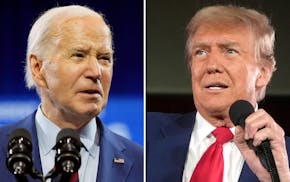The Minnesota Senate approved a two-year pay freeze for school employees on Wednesday, a move Republican supporters said would prevent cash-strapped school districts from firing teachers and cutting vital programs.
The bill, which was passed 36-29, would prohibit districts from raising wages in new two-year contracts with teachers, though it does not affect contracts already in effect. It also would bar school employees from striking to demand more pay.
Sen. Dave Thompson, R-Lakeville, the bill's sponsor, said the legislation would free needed funding.
The state's teachers union, Education Minnesota, lobbied fervently against the bill, arguing that wages should be negotiated at the local level without intervention from the state.
Thompson's bill would also eliminate several mandates that require schools to set aside money for staff development and other purposes.
The legislation ignited debate over "local control" in education -- the notion that local school districts know best the decisions that must be made. But Thompson said school districts are already tied down by state and federal mandates. "Local control is not real," he said during Thursday's floor debate. He has said in the past that the state's ideal education statute should be "about half a page long."
Sen. Barb Goodwin, DFL-Columbia Heights, said teachers understand the financial realities facing school districts and can negotiate their own freezes.
"This bill ... tells our teachers and our public schools and our public school staff that they are not capable of understanding the problems," Goodwin said.
The Minnesota School Boards Association (MSBA) and the Minnesota Association of School Administrators (MASA) -- those on the other side of the negotiating table -- supported the bill.
MASA Executive Director Charlie Kyte estimated that the bill would save school districts about $80 million.
"When we step back and look at this, we said it's pretty Draconian, we hate to be doing it," said Charlie Kyte, executive director of MASA. "But the reality is we can hang on to about -- modestly -- 1,500 of our teachers."
Minnesota teacher salaries and benefits rose an average of 3.8 percent after the last round of negotiations -- down from 6.6 percent in the previous period, according to the MSBA.
Education Minnesota contends that half of those recent increases are attributable to rising health insurance expenses.
Education Minnesota President Tom Dooher said that "local decisions about this are best made locally and not by policymakers in St. Paul."
A similar bill was recently introduced in the GOP-led House and awaits a hearing.
Eric Roper • 651-222-1210

Trump says Biden is running a 'Gestapo' administration. It's his latest reference to Nazi Germany

Denial and uncertainty are looming over a Biden-Trump rematch 6 months out from Election Day

Hush money, catch and kill and more: A guide to unique terms used at Trump's New York criminal trial
What a judge's gag order on Trump means in his hush money case

